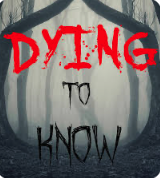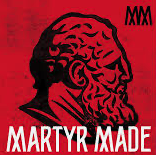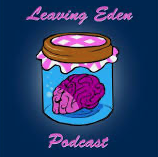(Jason Dikes holds a degree in broadcast communications from Stephen F. Austin State University, an MA in history from the aforementioned institution, and an MLS from The University of North Texas. He currently is an adjunct professor American history at Austin Community College and a cataloging librarian for the City of Round Rock. His complete collection of articles for this site may be found here. He may be reached at jdikes@austincc.edu.)
Following what has become a tradition over the last six years of the jonestown report, this is our annual review of podcasts dealing with Jim Jones and Peoples Temple. This edition covers podcasts episodes from Dying to Know, Leaving Eden, and Martyr Made. I did find only three shows, and none of them were from 2024. Admittedly, this is a small number compared to previous years. Whether the explanation is that they weren’t available on Apple’s pod catcher – which is my default app for finding episodes – or this isn’t a significant anniversary year, or I just missed them, I don’t know. As in the past, though, I will report in future editions any that I overlooked from this year.
Let’s get to it.
 Dying to Know (August 20, 2021)
Dying to Know (August 20, 2021)
Hosts Jimmy and Lindsay decide to focus more on Jonestown and the aftermath, but in less than four minutes, they mentioned young Jim’s fascination with Hitler. Well, there we go.
Basic timeline errors were made about what year Peoples Temple was formed, the mispronunciation of words and names was rampant, and host Jimmy had an odd delivery. You know how when you tell a scary story and you reach the punchline, you slow down and enunciate each word? For example, “…he came around the side of the car…and there…on the door handle was…the killer’s hook.” He does this a couple of times at the weirdest moments: “…and then…he married…Marceline Baldwin.” I know marriage can be a scary thing, but usually for the people involved, not the audience.
Some statements just made my head spin, such as: “You don’t hear a lot about his early life.” “It’s debated whether Jones sent the shooters to the airport.”
I try to go easy on “true crime” podcasts that feel obligated to pump out a new episode a week – since that doesn’t give them time to do a lot of research – but even with that caveat, this is one you can safely skip.
Sadie Carpenter – a self-proclaimed cult expert who escaped from the Independent Fundamental Baptists, which she considers a cult – devoted this episode to Peoples Temple and Jonestown. Using Wikipedia, the Jonestown Institute website, and websites maintained by survivors, she does something unusual in that she spent a fair amount of time on the Nazarene Pentecostal background Jones came up in with its strict rules surrounding alcohol and sex and its focus on good works. After giving a basic timeline from the Temple’s origins in Indianapolis to its exodus to California, she then follows the stories of three survivors: Leslie Wagner Wilson, Tim Carter and “hippie lawyer” Tim Stoen. But she does so in a frustrating way, by talking about an experience that one of them had before veering off onto a long unrelated digression.
There are also some timeline errors and mistakes about who did what, notably that Leo Ryan was assassinated while he was onboard the plane, and another that Tim Carter was tasked with carrying the money before he saw his wife and child die, rather than after.
The first part about the Nazarene Pentecostals was interesting but after that, there was nothing that can’t be heard somewhere else.
 Martyr Made (03/04/2019, 04/15/2019, 06/23/2019, 02/10/2020, 06/14/2020, 06/15/2020, 10/17/2020)
Martyr Made (03/04/2019, 04/15/2019, 06/23/2019, 02/10/2020, 06/14/2020, 06/15/2020, 10/17/2020)
Long. Nearly 30 hours spread over seven episodes. The last episode is just shy of eight hours. The purpose of this podcast is to provide a social history of the era from which Peoples Temple emerged and to see how those movements affected Jones his followers. To do this, it spends a lot of time on the civil rights movements and on the student movements of the 1950s-1970s. In fact, the entire third episode is about the civil rights movement, and most of the fourth episode is about the SDS and the Weathermen, including their history, their operations, their setbacks, and their fragmentations. So how did these events and personalities feed into Peoples Temple? How did the March to Selma affect Peoples Temple? How did the “Black Power” movement affect them? How did free love and drug use affect them? Specifically, would Jim have become a drug addict in the 1950s when drug usage was still underground? Would Jim have had so many sexual partners without the free love movement? Interesting questions. Not many answers.
There are other problems along the way. The host Darryl Cooper says he doesn’t put a lot of stock in the stories about Jim’s childhood – despite the many eyewitnesses to it– but then proceeds to tell the stories anyway. He confuses Sharon Amos with Teri Buford. And try as he does, he ultimately fails to keep his bias against liberals out of the narrative. He comes down hard on the white liberals who survived Jonestown and now, paraphrasing, cry to every documentarian about how they were the real victims instead of the elderly black ladies who died.
In particular, he despises Tim Carter, especially since Tim agreed to carry the Temple’s money out of Jonestown after watching his wife and child die. I can understand his antipathy towards Carolyn Moore Layton, but he turns it toward her parents as well: Carolyn was “groomed” by her liberal parents for a group like Peoples Temple; and the sermon that her father Reverend John Moore gave on the first Sunday after the Jonestown deaths would not have been out of place in a Peoples Temple meeting. His final jab at Carolyn is in his description of a moment on the Death Tape, when a female voice says: “And the oldest children can help love the little children and reassure them. They’re not crying from pain. It’s just a little bitter tasting but, they’re not crying out of any pain…” He states without equivocation that Carolyn says that, but he is the only one who does. Other sources attribute it to Maria Katsaris or to an unidentified woman. About the only survivor he has any sympathy for is Stephan Jones.
He does talk a lot about the very good things the Temple did, such as the care for the elderly, and the rehabilitation centers. Deanna Wilkinson’s story is one he spends a lot of time on – how her face was burned, and how she turned to prostitution before finding freedom in the Temple – and even tears up when telling. He acknowledges there are a lot of stories like hers, but what he fails to admit is that those successes were often due, not entirely, to the white liberals who, Cooper feels, probably should have died in Jonestown with the monster they enabled.
I could understand that point of view if, in episode seven, he didn’t conclude that white liberals’ fascination with Black Power, and their funding of it, ultimately fragmented and doomed the civil rights movement. It feels like a long path to a hit job.
If you can get past this bias, this is worth listening to.
